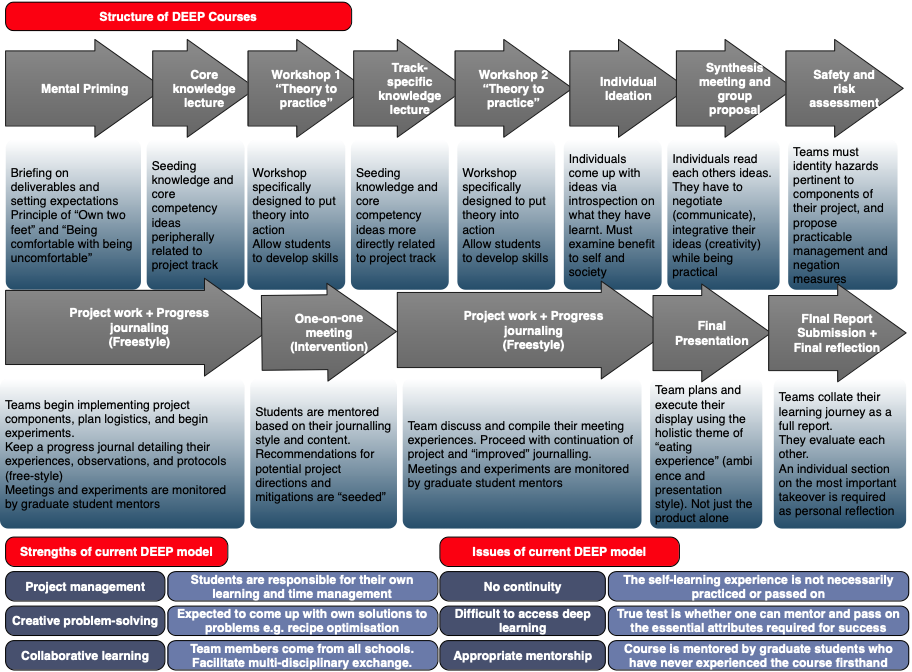biodatascience
This is the web resource for NTU's Bio-Data Science and Education Laboratory
Deeper Experiential Engagement Project (DEEP)
Informal education is commonly associated with acquisition of non-academic abilities. This is in contrast to formal education, which typically focuses on acquisition of academic abilities. Academic abilities alone are insufficient for workplace readiness. Non-academic abilities, supplementing academic abilities are increasingly recognized as important. This creates demand for universities to creating opportunities for non-academic development.
To augment existing programmes, an experiential learning model, “Deeper Experiential Engagement Project” (DEEP) was developed that may promote acquisition of both non-academic and academic abilities. Given the tight curriculum confronting undergraduates, this double purposing is efficient.
DEEP is informal because it leverages on student clubs and maker’s learning spaces, instead of traditional classroom setting, with minimized intervention from professors. DEEP closes the learning loop by extending beyond hobbyist interest into self-directed learning. DEEP’s basic structure has been refined over years of iterative development. Two data science courses are built on the activities of student-led data science clubs. During training workshops, students are incentivized to take on credit-bearing DEEP courses, innovatively designed for interest/hobby-inspired informal learning, to take on and complete creative projects.
A DEEP course has the following design elements:
-
The sequence of deliverables we expect from students (as part of what they are assessed) throughout the project are manifestation of their thoughts naturally generated in a creative process, in order not to reduce the students’ degree of “hobby/interest-based” motivation. These include ideation by individual students, synthesis of proposal as a team, progress journaling and reflection, presentation of products and sharing of experience.
-
The scope is encompassing enough to require cross-disciplinary application and problem solving. For example, in the eating experience DEEP course (BS8101), students have to consider the chemistry of taste and aroma molecules, the biology of the raw material, the physics of heat transfer and consider engineering principles to make their own tools necessary for certain cooking methods. Thus, in the “Smoked Food” project, team members constructed their own hot and cold smokers using household items, investigated how the type of wood used and the duration of smoking affected or enhanced taste in a variety of local dishes. The proposed data science scope in this study also requires drawing insight from multiple disciplines and drawing connections across fields [1].
-
The involvement of the faculty is limited to two or three critical touchpoints, so that students’ sense of ownership of the project is reinforced. Instead, facilitation of some necessary discussions is assisted by graduate students who are closer to the undergraduates’ age, or senior students leading student organizations.
-
The course is classified as General Elective Requirements (GER), which does not limit subscription to only a restricted programme. A team is made up of students organically drawn together because they were interested in the same hobby and creative theme e.g. through the data science clubs, and yet may come from different disciplines.
-
One key intervention by the faculty is included in the process – a one-on-one coaching to individual members after the team has done a few rounds of experimentation without interference. The faculty draws input from the student’s progress journal. The coaching only addresses the approaches taken by the student e.g. the faculty may suggest alternative approaches or query the decisions made, but strictly do not instruct on “what and how to do”.
-
The project process starts with the phase of “ideation” and concludes with presentation of their learning journey, allowing the comparison of their initial to the final state through monitoring of the submission of ideation, team proposal, progress journal and final report. The rubrics were designed to assess aspects of logical thoughts and creativity, as well as to acknowledge an individual’s “growth”. In many cases, “growth” is an important aspect of such courses intended to promote creativity and innovation.
The structure of a DEEP course is as follows:

References
- Goh, W.W.B. and C.C. Sze, AI Paradigms for Teaching Biotechnology. Trends Biotechnol, 2019. 37(1): p. 1-5.